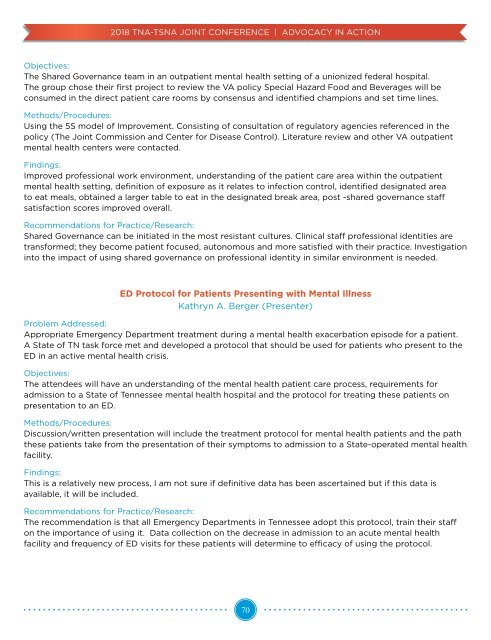2018 TNA and TSNA Joint Annual Conference
You also want an ePaper? Increase the reach of your titles
YUMPU automatically turns print PDFs into web optimized ePapers that Google loves.
<strong>2018</strong> <strong>TNA</strong>-<strong>TSNA</strong> JOINT CONFERENCE | ADVOCACY IN ACTION<br />
Objectives:<br />
The Shared Governance team in an outpatient mental health setting of a unionized federal hospital.<br />
The group chose their first project to review the VA policy Special Hazard Food <strong>and</strong> Beverages will be<br />
consumed in the direct patient care rooms by consensus <strong>and</strong> identified champions <strong>and</strong> set time lines.<br />
Methods/Procedures:<br />
Using the 5S model of Improvement. Consisting of consultation of regulatory agencies referenced in the<br />
policy (The <strong>Joint</strong> Commission <strong>and</strong> Center for Disease Control). Literature review <strong>and</strong> other VA outpatient<br />
mental health centers were contacted.<br />
Findings:<br />
Improved professional work environment, underst<strong>and</strong>ing of the patient care area within the outpatient<br />
mental health setting, definition of exposure as it relates to infection control, identified designated area<br />
to eat meals, obtained a larger table to eat in the designated break area, post -shared governance staff<br />
satisfaction scores improved overall.<br />
Recommendations for Practice/Research:<br />
Shared Governance can be initiated in the most resistant cultures. Clinical staff professional identities are<br />
transformed; they become patient focused, autonomous <strong>and</strong> more satisfied with their practice. Investigation<br />
into the impact of using shared governance on professional identity in similar environment is needed.<br />
ED Protocol for Patients Presenting with Mental Illness<br />
Kathryn A. Berger (Presenter)<br />
Problem Addressed:<br />
Appropriate Emergency Department treatment during a mental health exacerbation episode for a patient.<br />
A State of TN task force met <strong>and</strong> developed a protocol that should be used for patients who present to the<br />
ED in an active mental health crisis.<br />
Objectives:<br />
The attendees will have an underst<strong>and</strong>ing of the mental health patient care process, requirements for<br />
admission to a State of Tennessee mental health hospital <strong>and</strong> the protocol for treating these patients on<br />
presentation to an ED.<br />
Methods/Procedures:<br />
Discussion/written presentation will include the treatment protocol for mental health patients <strong>and</strong> the path<br />
these patients take from the presentation of their symptoms to admission to a State-operated mental health<br />
facility.<br />
Findings:<br />
This is a relatively new process, I am not sure if definitive data has been ascertained but if this data is<br />
available, it will be included.<br />
Recommendations for Practice/Research:<br />
The recommendation is that all Emergency Departments in Tennessee adopt this protocol, train their staff<br />
on the importance of using it. Data collection on the decrease in admission to an acute mental health<br />
facility <strong>and</strong> frequency of ED visits for these patients will determine to efficacy of using the protocol.<br />
70

















